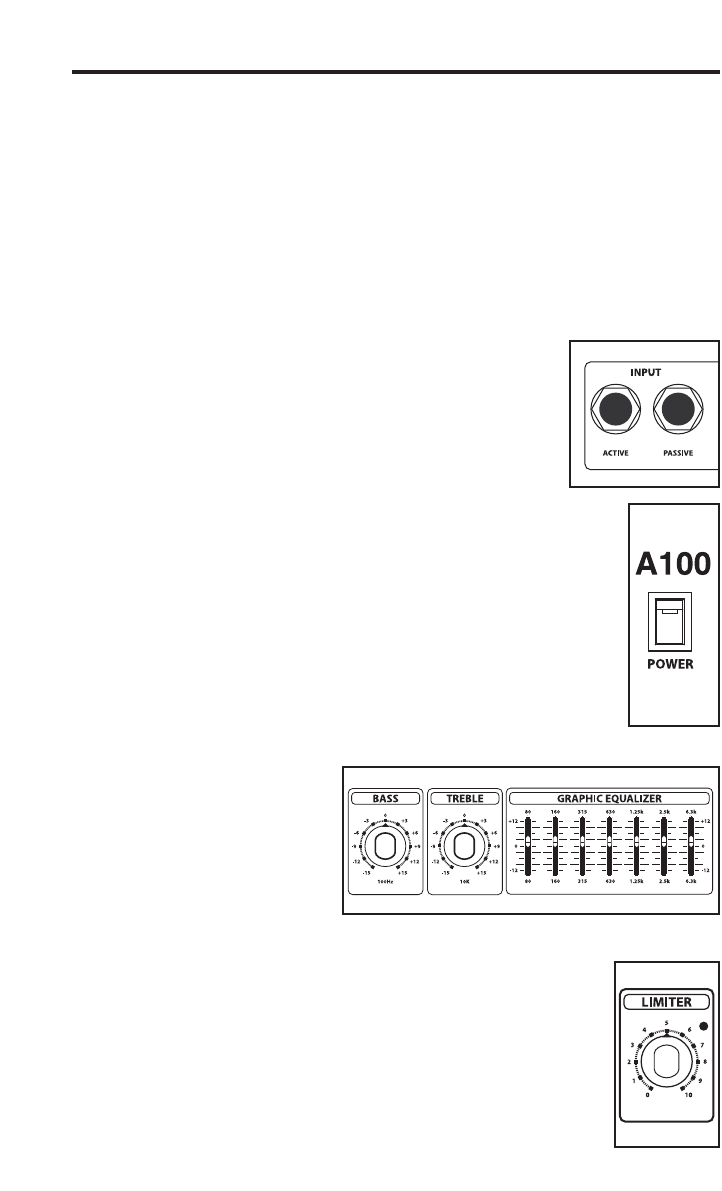
7
Setting Up and Using Your Hartke A
SERIES Combo Bass Amplifier
Setting up your Hartke Systems A Series Combo Bass Amplifier is a simple
procedure which takes only a few minutes:
1. Remove all packing materials (save them in case of need for future service)
and decide where the amplifier is to be physically placed. You may decide to
use the “kickback” position for additional directionality and high frequency clari-
ty. To avoid potential overheating problems, make sure that the rear panel is
unobstructed and that there is good ventilation around the entire unit.
2. Before you plug-in the power cable, be sure the Power switch is in
the off position. Connect the supplied power cable to the AC inlet
located on the rear panel. Then, plug-in the 3-pin AC plug into any
grounded AC socket. Don’t turn the A Series on just yet, though.
3. Use a standard music instrument cable to connect your bass to
the Input jack on the front panel. If your bass has passive electronics
(that is, if it has no battery), plug into the Passive input. If your bass
has active electronics (that is, if it has a battery), plug into the Active input.
4. On the front panel of the A Series, turn the Volume and Limiter control to
their minimum (fully counterclockwise) position. Set the Bass, Treble and all
seven graphic EQ sliders to their “0” position.
5. Press the front panel Power switch in order to turn on your A Series amp;
the LED in the switch will light up.
6. Set the output of your bass to maximum and then, while playing, slowly
turn the A Series Volume control up until the desired level is achieved. It’s
nearly impossible to overload the A Series amplifier, so if you hear distortion
even at low Volume settings, check for a faulty cable (if it’s good, simply back
off the output of your bass).
7. Adjust the Bass, Treble and
graphic equalizer controls to taste.
(When you get a great setting that
complements your instrument and
playing style, it’s a good idea to write
it down for future use.)
8. Now try out the A70 / A100 limiter circuitry. Activate it by turning the Limiter
knob clockwise from its “Zero” position. As you turn the knob clockwise,
the input signal from your bass becomes more and more severely com-
pressed—you’ll hear peak signals (such as string slaps and pulls) begin to
sound increasingly “squashed,” relative to the lower-level signals produced
by standard playing. The result will be a decreased dynamic range but an
overall leveling of signal throughout the full pitch range of your instrument.
In the A70 and A100, the Limiter LED will light steadily green when no com-
pression is being applied, will go out whenever small amounts of compres-
sion are being applied and will flash or light steadily red when limiting
(severe compression) is being applied.


















